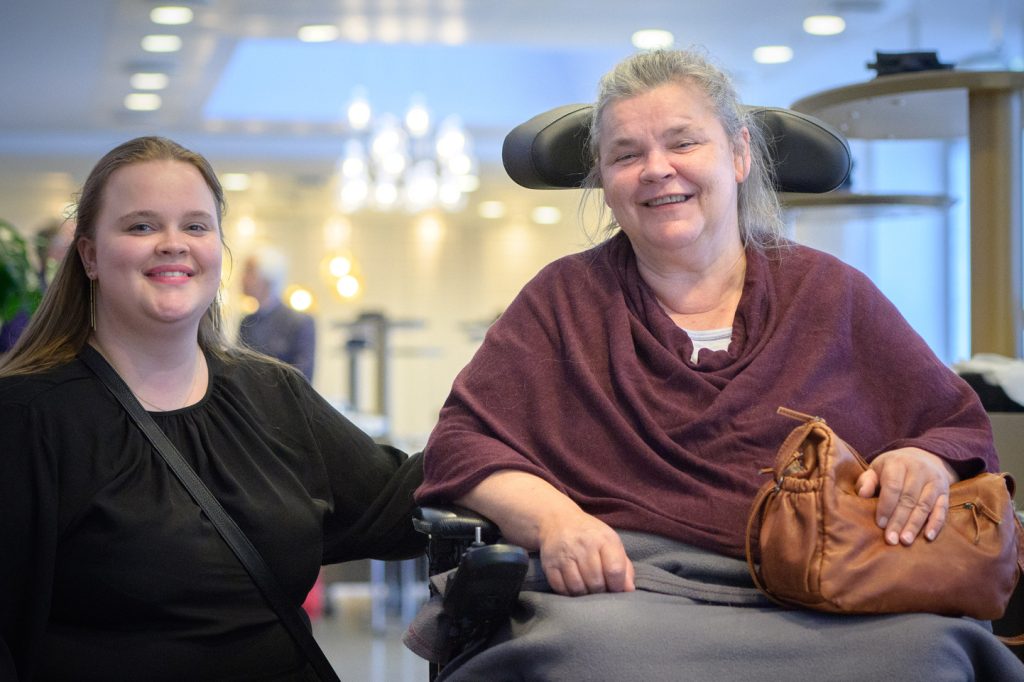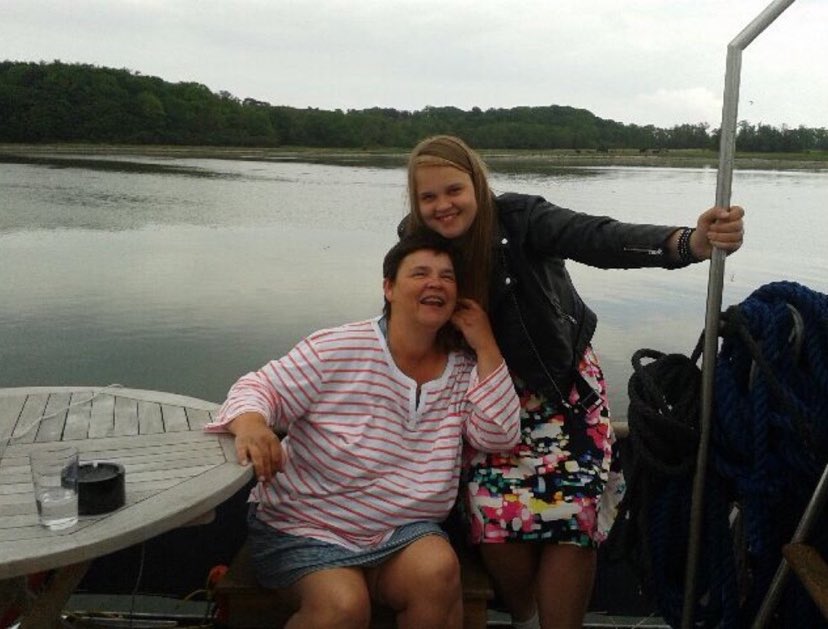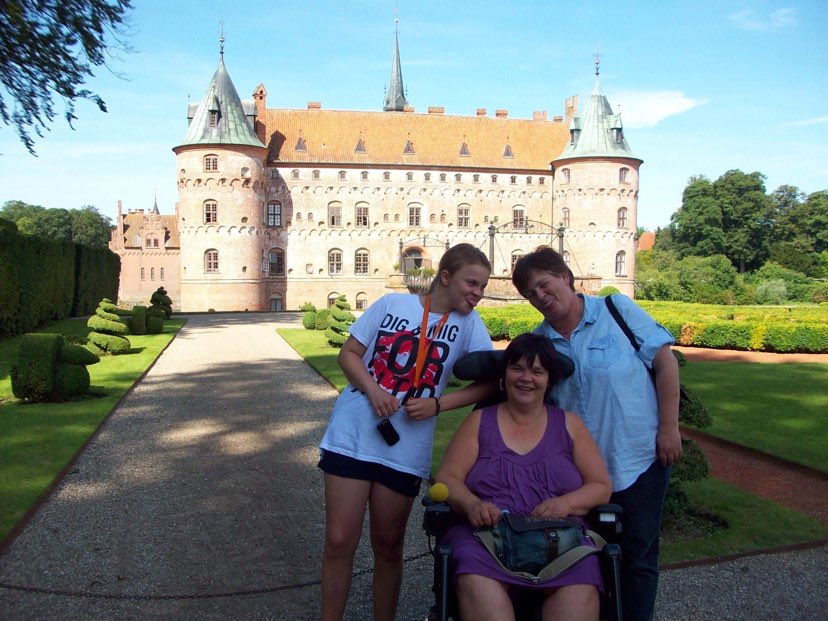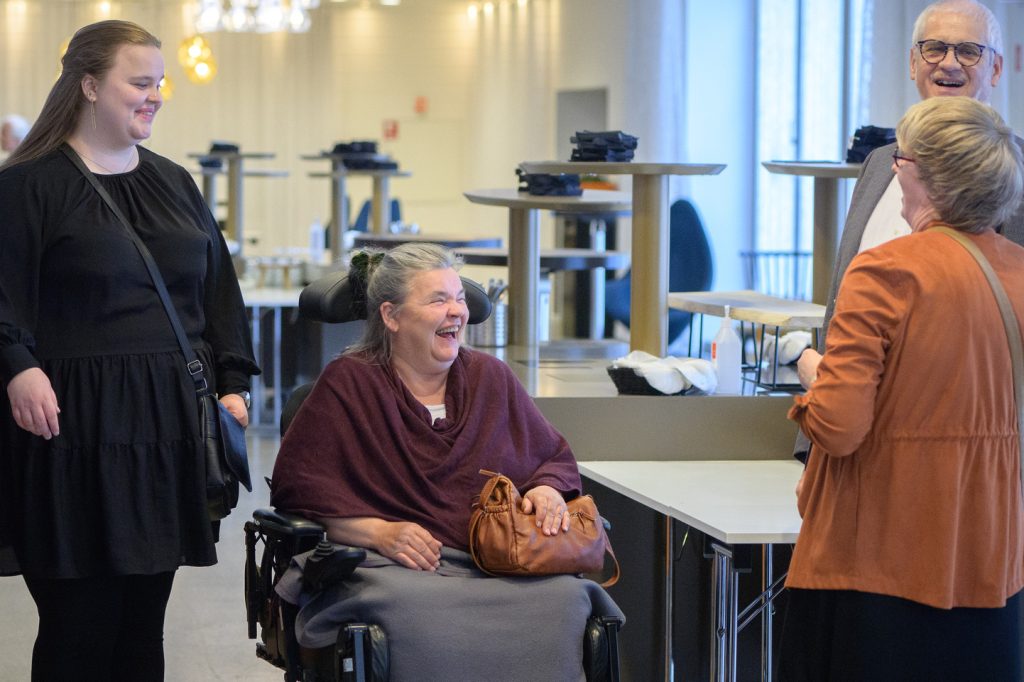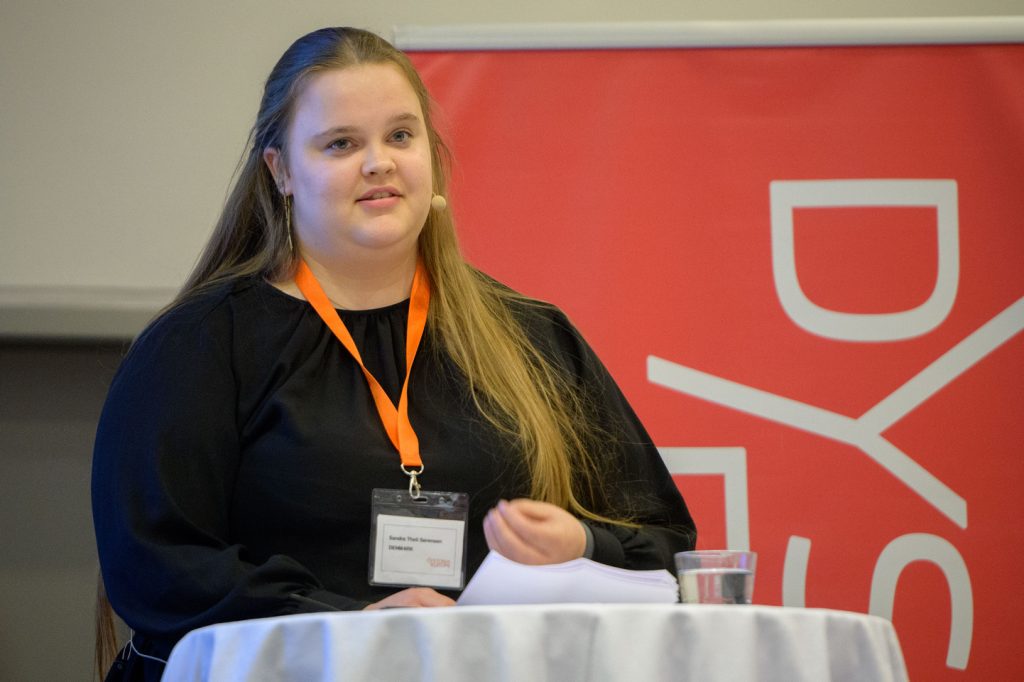
My name is Sandra, and I am from an island called Fyn in Denmark. I do not have dystonia myself, but my mom does. She has generalised dystonia and uses a wheelchair. My story will not be about having dystonia. My dystonia story will be about my experience growing up with a parent with dystonia.
My mom had shown symptoms of dystonia since she was 4 years old, but it was not until I was about 9, that she was diagnosed. Like many other people with dystonia, it took years before the doctors got it right.
Over the years she had many different diagnoses, and she was on a lot of different medications. Medication that she did not need, and therefore it did not always have the best effect. One day, when I was in school, she hallucinated that I was in the room with her sitting at the dinner table doing homework. She was 100% sure that I already left for school, and for that reason she called her doctor and demanded to stop the medication that she was on. Thankfully the doctor let her gradually reduce her medication. But she was still affected for a time and afterwards there was new medication that she needed to try.
It was around the time, when she was diagnosed, that her cramps and convulsions got worse. She would have cramps that would last up to 4 hours at a time, and it became more and more frequent. That was when the local authority started to investigate what changes were needed to make our living condition to be the best it could be.
Now, I am happy to be in a country where this help does not cost us personally anything. We would not have been able to afford an electric wheelchair and many other things, if it was not for the welfare state we live in, and I am grateful for that. But when things like this are free, it takes a lot of time for everything to be set in motion. And even though you can meet a lot of nice and realistic people you can also meet people, who may be more focused on budget cuts than the actual people they need to help. So it took time before the right help arrived and, in the meantime, I was alone with my mother watching her get worse.
Even though my mom always tried to have a brave face, it was easy for me to see, when she was laying on the floor, cramps in her whole body, being stuck in a doorway or under a bed, that things were not okay and that she was not okay. She would always tell me to call someone from my family to come help us and in the meantime, I would do my homework or play computer games. She did not want me to see her in so much pain, but I could still hear her from the other room.
The big, long lasting cramps is something I got more used to the older I got, but when I was a kid I remember I was really scared of them. And even though I do not remember this myself, my mom has told me that one day I said to her that “if she was going to die, then I wish that she would die now”. Now my mom lost her mom at a young age so she kind of understood where it came from, even though she was a bit freaked out. She understood that I did not wish for her to die. I just did not want her to suffer if she was going to die of the cramps anyway.
The thought of my mom dying came from the fact that I did not understand what was happening. In my head I was seeing her in pain and as a kid I thought that meant that she was going to die. So, when my mother heard this, she sat down with me and talked to me, and she let me explain what I meant and let me ask all the questions that I wanted.
I also got to say that I wish she had never gotten me, because then her life would be a lot easier if she did not have to take care of me, but every time I said that, she would tell me that the reason she has all this energy and the reason she keeps going is because of me and that I should never think anything else. Now I have met kids, who also have parents with dystonia or other diseases, but where it was not talked about. It was hidden away to protect the children. I understand the protective thought behind the action, but that does not necessarily mean that the outcome will be the best. I think that is the best advice I can give to parents with dystonia: Speak to your children.
It may seem like you are protecting them but children see a lot more than you expect, and imagination can be much more horrible than reality. Had I not spoken to my mom and had she not told me that she would not die from dystonia, I would have gone through my childhood thinking that one day she would die in one of her cramps while I was sitting in the living room doing my homework.
Today I do not believe that my mom will die during one of her cramps but the memory of seeing her in so much pain is something I still must deal with. Because when she was lying there even though I knew she would not die I still felt very helpless. Because I could not help her and I could not take her pain away, I needed to accept that I never will. I can say that I have not totally accepted it yet and I think that is something most next of kin can relate to. Because you will never not want to take your loved one’s pain away.
My mom also knew this, and she also knew that as a kid I should not end up staying at home taking care of her. That also meant that I had A LOT of after school activities.
I sometimes had so many that I started to neglect some of them, because it was simply too much. I would play handball twice a week and on weekends, I would play drums once a week and I should have practiced 1-2 hours a day, but that never really happened. Then I was also in after school care almost every day, where I had a rabbit I needed to take care of. In the end it was too much because I actually wanted to be home sometimes, not to necessarily take care of my mom but just to be home.
I know that it was a way to protect me, but I think finding a middle way is the best way to make sure that the child does not become the adult, but also to make sure that it is possible for the child to be at home and to not be overwhelmed. It did not feel like my mom did not want me in the house, but it did sometimes feel like she was hiding how bad she was.
What I did appreciate with all these activities was that every time I had a show or a game my mom would always be there. Even though me playing drums would make her cramp she always showed up at least for the first 10 minutes until she had to walk out. She always used to say that she would cramp the most when the music she was listening to was REALLY good. So if she left early that meant that I was playing REALLY well. I do not know if it was the truth but it did make me happy and it made it alright for her to leave if she had to. So even though other people would think she was weird for leaving, it was never weird for us.
I have heard many stories about kids being bullied because their mom or dad was disabled. But weirdly enough that was not the case at my first school. It was probably because it was not just me who had a parent that was a bit different. Even when I was getting bullied for other reasons no one would ever want to use that against me, and I hope it was because they knew that it was wrong. But people I meet outside of this school did not always have the same mindset. Especially when I had to change schools. It was the first time where I could really see how ignorant people could be when it came to just being around a person in a wheelchair. Some of my friends would just stare at my mom and some would not answer her when she spoke to them. Not necessarily because they wanted to be mean, they just had no idea how to act. I would always tell them beforehand that my mom was in a wheelchair, so they would not be surprised or get worried. So it was not the surprise that made them act like this. I didn’t really ask them why they acted like they did, I just hoped that they had never really interacted with someone who was in a wheelchair. And I remember it made me think that I was happy that I did not grow up like that.
I could let it go when it was with my friends who did not know what to do, because they were kids like me. And when I got older most friends did not have a problem new or old, because they were used to it. What I could not let go of was, when grownups acted like a person in a wheelchair was the most interesting thing they had ever seen. I cannot count how many times random people would come up to my mom and pinch her toes, usually followed up with “oooh, my little friend, why haven’t they put any shoes on your feet”. This was not young people; it was often middle-aged people, who would touch the toes of someone they did not know. When people did that it would often lead to my mom cramping. And in the beginning I would stand there looking, not being able to say anything and just be sad.
I could not understand how I as a child knew what was right and what was wrong, when a grown-up did not. The older I got the more I started to really understand what was happening. It used to make me so angry when people would disrespect my mom with their assumption that when she was in a wheelchair she must be mentally handicapped. I usually would not say anything to these people because I was so angry, that if I opened my mouth it would not be pretty words that came out and I knew my mom did not want that.
So then I would stand there looking not being able to say anything and just be so angry.
But fortunately, when I was about 12 or 13, I matured a bit and I somehow stopped being angry. I started to feel sorry for the people who were touching my mom and who were saying all these weird things. Because if the most exciting thing in a person’s life is a person in a wheelchair they must have a sad and boring life. So instead of being sad or angry I just started thinking that these people really needed a hobby to keep them entertained. I sometimes also thought inside my head “my mom is a chemistry engineer, what are you” and I would often in conversations mention that she was a chemistry engineer. Not because I wanted to be on a high horse or to be mean, but it was a coping mechanism to think it and a way to make people understand that there was nothing wrong with her brain. It was just her body that did not want to do the things that she wanted to do.
Now years have gone by and we live in a smaller city, so it does not happen very often anymore but when it does happen, we make the person stop and I think the same thing, that the person needs a hobby and then we can laugh at it later. Because that is something that we have always done and something I think has helped me get out of the sadness and the anger. We have always been able to laugh in the most absurd times. It has sometimes worried people when we have laughed after my mom cramping for three hours, but we did and do not care because it is a way of coping with what is happening. Especially as a child, seeing my mom making these horrible episodes into something less horrible by joking and laughing has made it a lot easier to live with what I had to see, hear, and feel.
I have also been sad seeing some of my mom’s friends disappear from her life. She has put so much laughter into my childhood, that I did not see how much it affected her that most of her friends were not around anymore.
I have been to two boarding schools, been an au-pair in London, travelled in Asia for months and I did not realise the effect this had on my mom before I moved out and into my own apartment. Because now I did not see her as much but when I saw her, I could see that she missed having people around joking and having fun with. It made me sad because when I realised this, I knew that it did not happen overnight. I then tried to push her into speaking with her old friends and reminded her to talk with her new friends. I can see that it has made her a lot happier and has given her more energy. I wish I had seen it sooner. I wish I could have pushed her in that direction earlier. I know it was not my responsibility as a kid, but I also know that she would have been happier, and it would have been easier for her to be the smiling and happy mom that I remember.
With this speech I wanted to give some advice to people who are in a similar situation. Things we did that were helpful but also things we could have done differently. I think the most important thing is to be open about the disease, do not overdo it but it’s important not to hide it. We cannot expect the rest of the world to know and understand dystonia if we cannot talk about it in our own house.
Do not make kids the grown-ups and let them still spend time at home. It is important to find a middle way.
Try not to get cut up in emotions like sadness and anger. I wish I would have stopped being angry much earlier, because these bad emotions drain your energy. Energy you could use on activities or just to be happy.
At last, use laughter to overcome your own fears for the disease. But also for the children’s fears. It helps to see parents laugh even in the hard times because it is reassuring that things will be alright.
I hope some will be able to use them, thanks for listening to me and my dystonia story.
Sandra Theil Sörensen
Denmark
